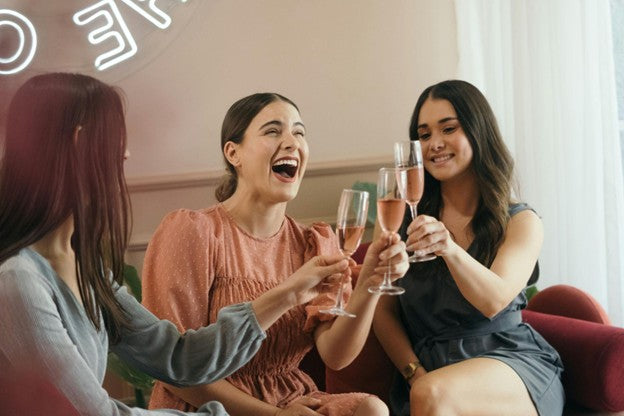
Why Is Dealcoholized Wine the New Wellness Trend?
Gone are the days when celebrating meant drinking alcohol: dealcoholized wine is now leading the wellness trend in the U.S. In the United States, young adults used to wait anxiously for their 21st birthday, when they could legally consume alcohol. However, these days, it seems that young Americans are finding a healthier way to celebrate.
Alcohol consumption rates are at an all-time low in the U.S., falling to just 54% of Americans saying that they drink alcoholic beverages. Adults aged 18 to 34 have an even lower consumption rate of just 50%, a whopping 9% decrease from just two years ago.
So, why the change, and how is dealcoholized wine paving the way for a healthier night of celebration?

Why Are So Few Americans Drinking Alcohol?
The same Gallup poll that uncovered the record-low alcohol consumption rates also looked at just why those numbers are happening. Gallup has been tracking Americans’ drinking behavior since 1939, and for the first time in the poll’s history, the majority of Americans say that they believe drinking any alcohol, even in moderation, is bad for your health.
They have a strong point. While it’s true that certain diseases associated with alcohol, like cirrhosis, primarily happen due to excessive consumption, the World Health Organization (WHO) claims that there is no safe amount of alcohol. Alcohol is classified as a Group 1 carcinogen alongside asbestos, radiation, and tobacco, being tied to at least seven different types of cancers.
While the risk for developing these cancers increases exponentially when more alcohol is consumed, half of all alcohol-attributable cancers in the WHO European Region are caused by what’s classified as “moderate” or even “light” alcohol consumption.

Also, many of the supposed “benefits” of drinking alcohol have been debunked. There used to be claims that moderate drinking was linked with a lower risk of dying from heart disease or diabetes, but studies have proven otherwise. There are far more risks than benefits, including potentially developing a dependence on alcohol, which can be deadly.
Even beyond the long-term health risks, think about the impact that alcohol has on a night out. Alcohol can cause intoxication, which clouds your mind and makes you more likely to engage in risky activity. Drinking too much may cause “brownouts” or “blackouts,” which means that you may experience partial or full memory loss of your evening. Why spend a night out with your loved ones if it means you won’t even remember it? These concerns are driving Americans to explore dealcoholized wine as a safer alternative.
Why More Americans Are Turning to Dealcoholized Wine
Giving up alcohol doesn’t have to be a challenge, as many Americans are discovering that there are alternatives, like dealcoholized wine. More and more celebrated vintners are embracing alcohol-free wine, utilizing different methods of dealcoholization to create low- or zero-alcohol wines, giving people the option to not have to give up wine when they go sober.
While there are no known health benefits to drinking alcohol, there are some associated with wine. Certain types of wine, particularly red wines, are rich in polyphenols. These plant chemicals are tied to lowered blood pressure, improved response to insulin, reduced oxidative stress, and an overall decrease in the risk for heart disease.
However, dealcoholized wine offers health benefits that surpass those of fully alcoholized wine. One of the health risks of drinking wine or other alcoholic beverages frequently is that the consumer is taking in more calories than they need, resulting in weight gain. Dealcoholized wine is typically lower in both calories and carbs than fully alcoholized wine. For instance, BEAU VIVA’s alcohol-free sparkling rosé is less than 17 calories per 100 mL. In comparison, a fully alcoholized rosé is about 130 calories for a standard five-ounce pour.

However, one of the hardest parts about giving up alcohol is losing an important ritual. From Champagne toasts at weddings to happy hours with colleagues who quickly become friends, alcohol is ingrained in many parts of our lives. It can feel like we’re losing something when we stop drinking alcohol. Some people may feel out of place when they’re no longer participating in the rituals they used to enjoy when spending time with family and friends. In some cases, they may even feel like they no longer belong if they’re not taking part in the ritual.
Giving up alcohol shouldn’t mean giving up time with the ones you love. Having the option to drink dealcholized wine lets you be a part of the ritual, though that tradition has now become zero-proof for you. You get all the health benefits without having to sacrifice or compromise on doing the things you love with the people you love.
Discover the Benefits of Dealcoholized Wine
Not all dealcoholized wines are created equal. The different types of dealcoholization methods can change the taste and may not fully dealcoholize the wine. BEAU VIVA utilizes vacuum distillation, which enables us to maintain the wine’s integrity and preserve even the most delicate flavors and aromas while completely removing the alcohol.
BEAU VIVA is one of the few types of dealcoholized wine that is completely alcohol-free, with an ABV of 0%, making it safe to consume for all those abstaining from any alcohol. It’s also vegan, making it accessible for people with all kinds of diets.
With only natural flavors, no artificial additives, no Velcorin, and no GMOs, BEAU VIVA is more than a health alternative. It’s a wine made by award-winning vintners in the South of France, created by people who understand the power that wine has to bring people together. Celebrate every moment with the ones you love, without compromising on your health, with a zero-alcohol wine that’s as delicious as it is a wellness boost.
With BEAU VIVA, dealcoholized wine becomes a delicious, health-conscious choice for every occasion.
Celebrate your way, the healthy way with BEAU VIVA.
